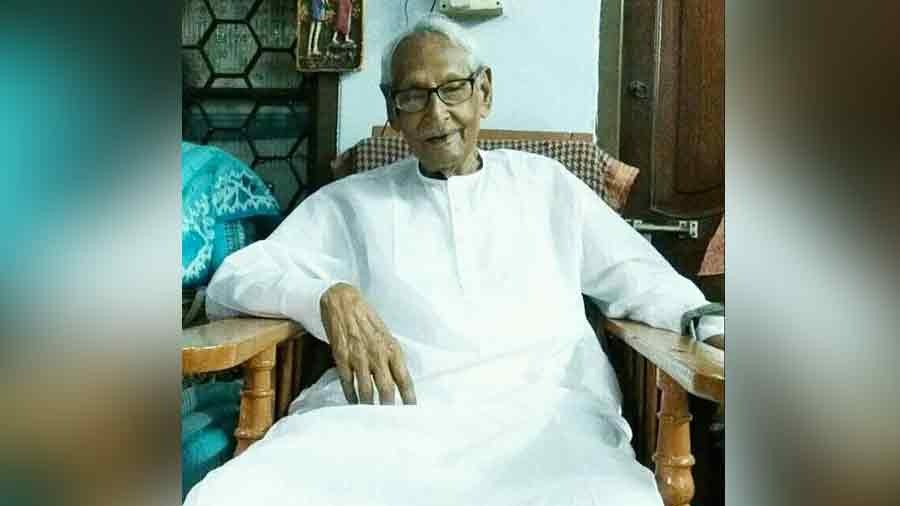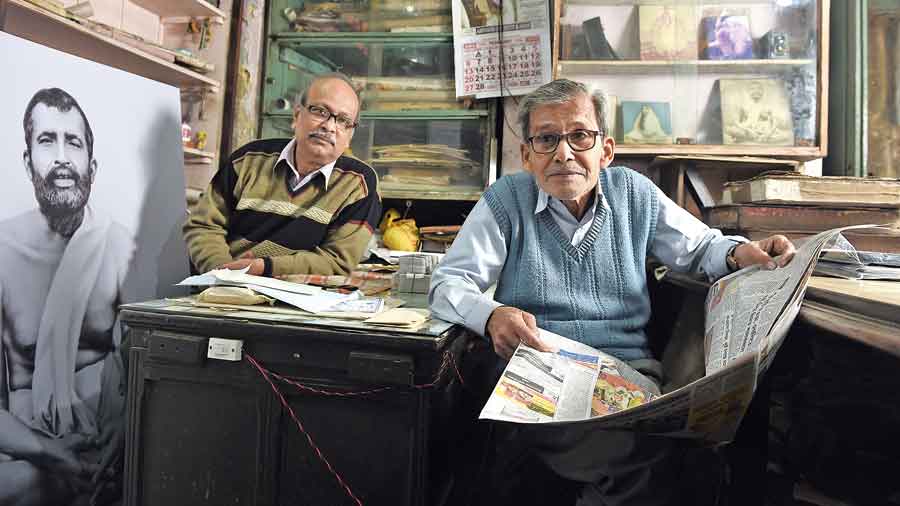“Ami mantro tantro kichhui janine maa…”
The soulful strain of Pannalal Bhattacharya wafts through Kolkata on the morning of Kali Puja.
Shyama Puja or Kali Puja is synonymous with this mellifluous Shyama Sangeet, but how many of us know the man who penned and composed this song? Chances are, hardly any one.
This brings us to professor Dilip Kumar Roy.
A living legend, grandson of the iconic poet, Rajanikanta Sen. Dilipbabu, or Mastermoshai, my sangeet guru of more than three decades, is a ripe young man of… 105!
He still sings with gusto, writes, composes and even accompanies himself on the harmonium.
The eldest of five siblings, he is the son of Santilata Roy, eldest daughter of Rajanikanta Sen. As the music trainer in HMV, from the 1940s through the ’60s, almost all contemporary singers of Kantageeti, Rajanikanta’s songs, received his tutelage. He was the pioneer in popularising Rajanikanta songs on AIR.
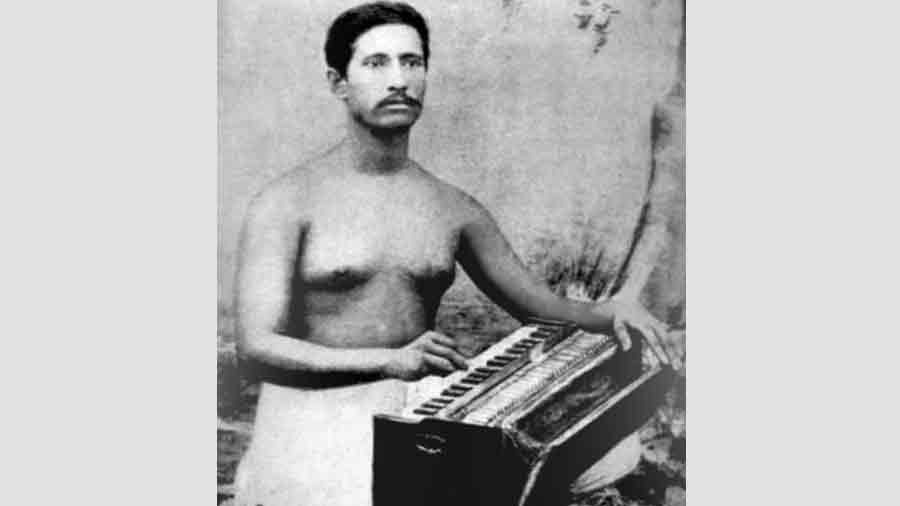
Poet-composer Rajanikanta Sen
Fiercely reclusive, Mastermoshai preferred to be behind the scenes while training a whole generation of artistes in the nuances of Kantageeti, as well as Atulprasadi and Dwijendrageeti. Names like Hemanta Mukherjee, Sandhya Mukhopadhyay, Pannalal Bhattacharya, Arghya Sen, Krishna Chatterjee, Santosh Sen Gupta, Anup Ghoshal, Nisith Sadhu come easily to mind.
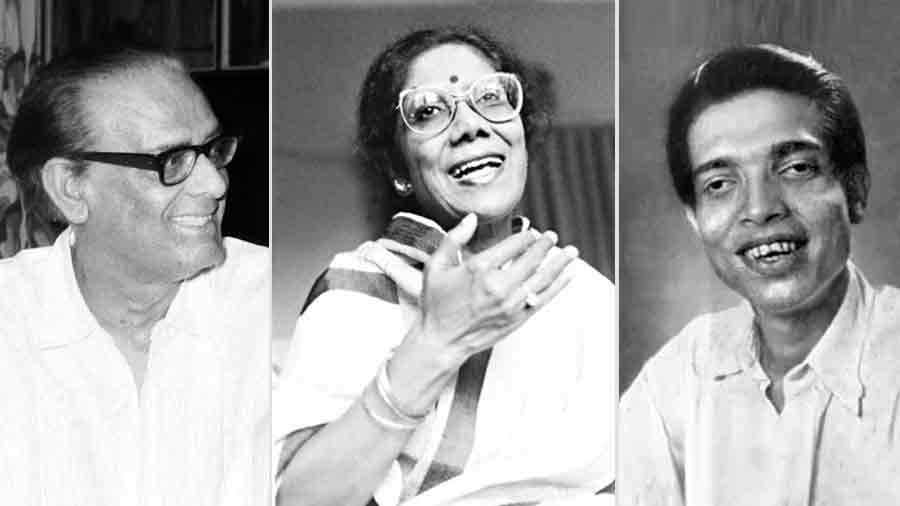
Mastermoshai trained a whole generation of artistes, including Hemanta Mukherjee, Sandhya Mukhopadhyay and Pannalal Bhattacharya, in the nuances of Kantageeti, as well as Atulprasadi and Dwijendrageeti
Blessed with a unique baritone, Mastermoshai has regaled select audiences with his considerable repertoire, nationally as well as overseas, down the decades.
At a time when Rabindranath Tagore straddled the musical firmament of Bengali songs as a colossus, Rajanikanta Sen was understandably overshadowed by the Nobel Laureate. His early demise also contributed to Kantageeti being restricted to a select audience. However, Mastarmashai took it upon himself to painstakingly resurrect those forgotten lyrics. Subsequently, with considerable help from his mother, Santilata Debi, and his uncles, he managed to revive the tunes and proceeded to popularise Kantageeti, Atulprasadi and Dwijendrageeti. Largely due to his untiring efforts, this triumvirate has found its rightly deserved place in the hearts of lovers of Bengali music.
The opening notes
Born on April 27, 1917, Mastermoshai started off without any formal training. He developed an interest in singing by listening to his mother and maternal uncles. His uncle, the renowned composer Sukriti Sen, introduced him to Senola company, where he was the trainer. It was here that Mastermoshai cut his very first record, “Tomay amay dekha holo, ei mohonar tirey” and “Oparey probhat holo”, in 1938.
Gradually, he began to cut discs under the expert guidance of Sukriti Sen, singing his compositions mostly. His first album had songs composed by Anupam Ghatak, Biren Bhattacharya, Samaresh Chowdhury. Later, he even recorded a song by Kazi Nazrul Islam. That was the era of 78 rpms and a large number of his early recordings can be found on vinyl. Singers of that era, like Shailo Devi, were often paired to record duets with him.
Mystery of the Geetinatya recital
In the pre-Independence days, 1941-46, a literary association by the name of Abhyudoy gained quite a reputation as a frontline anti-establishment outfit. Some of the prominent names involved were Premendra Mitra, Subodh Ghosh, Nirupama Roy, Probodh Sanyal and such personalities.
There was a particular Swadeshi ‘Geetinatya’ which was highly popular among the freedom fighters. Needless to say this irked the British Raj and Abhyudoy was banned. Mastermoshai was among the ones who would regularly sing the entire Geetinatya.
One evening, a sinister looking unwanted guest presented himself at the front door of his Entally home.
“Are you Dilip Kr. Roy?
Yes, how can I help you?
Do you know Abhyudoy’s Geetinatya?
Yes I do.
Can you sing the whole thing by yourself?
Yes I can!
Please come with me!”
Blindfolded, Mastermoshai was escorted to a dark and dingy room, somewhere. There, in the shadows was seated an unknown and unseen personality. All he said was: “Now sing!”
Mastermoshai sang the entire Geetinatya. Upon completion, he was promptly blindfolded again and escorted back home. Till today, the identity of the man in the shadows remains a secret!
Songs on the night of Independence
Bestowed with a phenomenal physique, Mastermoshai was a regular at swadeshi protests and fights. Mostly, however, he was requested to lend his enviable baritone at these gatherings. He even recalls the night of August 14, 1947, which was spent singing swadeshi songs throughout the night! Songs like “Banga amar janani amar; Jedin sunilo jaladhi hoitey” by Dwijendralal Roy, “Amra nehat garib, amra nehat chhoto; Mayer dewa mota kapor” by Rajanikanta Sen, “Hindu-o noi, muslim-o noi; Mora desh jaglo ebar” by Sukriti Sen, “Bolo bolo bolo sabey, Utho go Bharato Lakkhi” by Atulprasad Sen were among the few that were highly in demand to be sung in his resonant baritone.
Resurgence of Teen Kobir Gaan
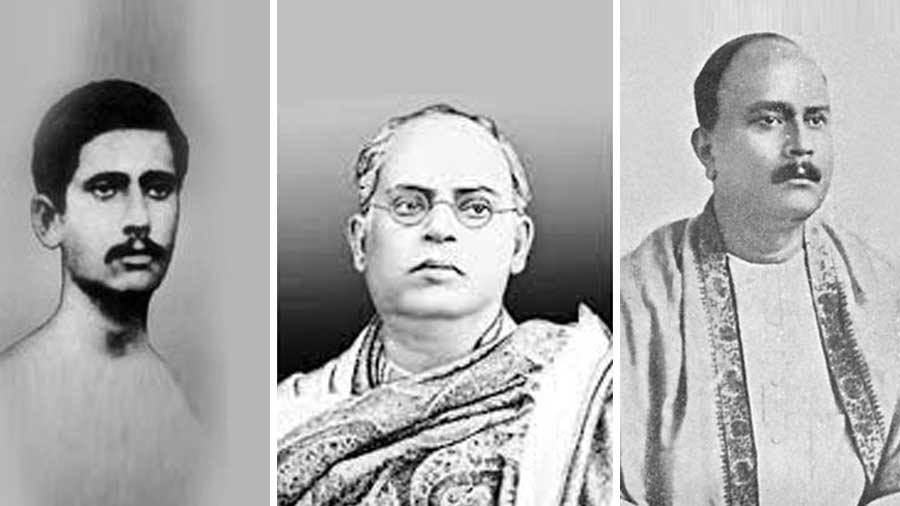
Rajanikanta Sen (left), along with the other two contemporary poet composers, Dwijendralal Roy (centre) and Atulprasad Sen
In the 1950s, when he was a trainer at HMV, the company fell out with Viswa-Bharati, over singing Tagore’s songs. This was an opportunity to popularise Bangali Adhunik gaan. Mastermoshai was entrusted with the task of training all contemporary artistes of repute, who were till then singing mostly Rabindrasangeet. He took it upon himself to acquire, revive and popularise songs of his grandfather, Rajanikanta Sen, along with the other two contemporary poet composers, Atulprasad Sen and Dwijendralal Roy. Anyone who was an artiste of standing, at that juncture, was trained by Mastermoshai in this genre. The starved audience witnessed a resurgence of the music of the fabled hitherto relatively unsung trio. Songs like, “Tumi nirmalo karo mongolo karey”, “Kobey trishito ey moru”, “Patoki boliye ki go”, “Ami akriti adhom” by Rajanikanta Sen became etched in the audience’s mind.
Teen Kobir Gaan had firmly arrived on the musical horizon with a bang, along with other “Adhunik” composers.
Mastermoshai to us, James Bond to Xaverians!
As a guru, Mastermoshai never had a rough word or a grim face for us. He was always smiling and encouraging. In all these years spanning more than three decades, I have never seen him ever use a single khata or songbook. His instructions were crisp and clear.
His technique of teaching was simple yet immensely educative. Learn the song first. Get it into your system. Emotions will come automatically. Let the audience feel through your rendition. Feel and emote but don’t show it. It should reflect in your voice. These priceless words still ring in our ears.
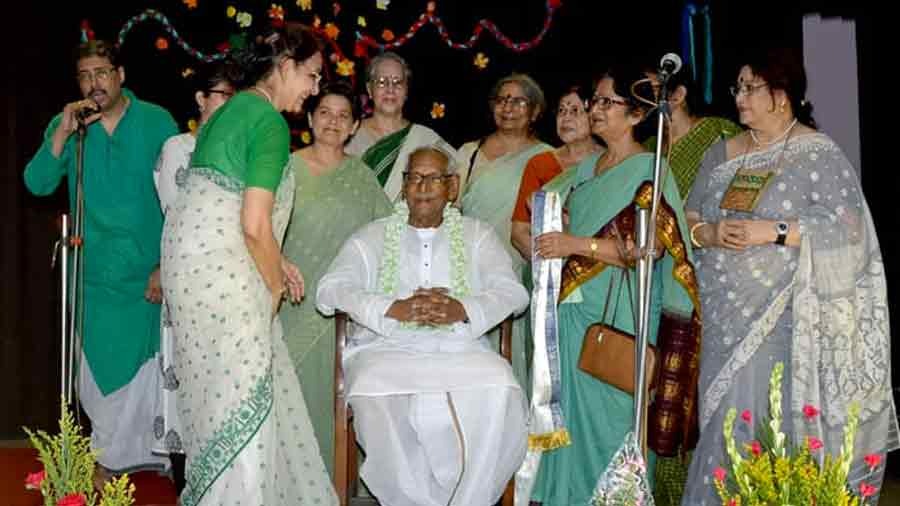
Mastermoshai with his beloved students
As they do in the ears of countless Xaverians. Though he was a lecturer demonstrator in the Chemistry department of St. Xavier’s College, he was the undisputed musical trainer in the college. Mastermoshai was also the students’ ‘agony aunt’ as well as their closest confidant. During his travels all over the world, be they in connection with his musical soirees or otherwise, the adulation he received from his erstwhile students remain a testimony to his years in St. Xavier’s College, where his charismatic personality had earned him the sobriquet of “James Bond”.
Mastermoshai also shared a great bond with the Reverend Fathers in college. This was echoed by the Principal at the time of his retirement, Rev. Fr. Antoine, who was an accomplished singer himself and on several instances both had been invited to sing at Brahma Samaj mandirs together. Their respect was mutual.
Singer, composer, poet, elocutionist… and teacher
Mastermoshai’s musical experience spans eight decades that includes proximity to such musical greats as Pankaj Mullick, Kazi Nazrul Islam, Himangshu Dutta, Dhakka Devi, Manju Gupta, Manoda Sundari Dasi, Aschorjomoyee Dasi, Aghorenath Chattopadhyay, the inimitable Prince musician S.D. Burman, K.C. Dey; Angurbala Devi, Indubala Devi singing Nazrul’s compositions; Suprabha Sarkar with Adhunik songs… the sheer range is staggering.
Mastermoshai’s greatness also lies in his humility. The reason why his group of students remain so close knit till today is the fact that he never discriminated between us. A raconteur par excellence, he always had his students and everyone else mesmerised by his tales of yesteryears, the artistes of yore, the musical ambience in the city in those days and so on.
Mastermoshai is a poet and a composer of no small means. His Aami montro tontro… among others bears testimony to the fact. He is also a remarkable elocutionist, especially of Tagore’s poems.
The government of West Bengal bestowed on him the title of Sangeet Mahaguru recently. The Calcutta Club felicitated him on being the oldest member of the club in 2021.
Mastermoshai was thoroughly peeved at us, his students, for organising his 100th birthday celebrations in 2016, but he also thoroughly enjoyed the chance to meet his students who thronged the venue!
To us, he will always remain Mastermoshai.
Though the physical self has weathered the onslaught of a century, his eyes still retain that elfish twinkle at 105.
Pranam.
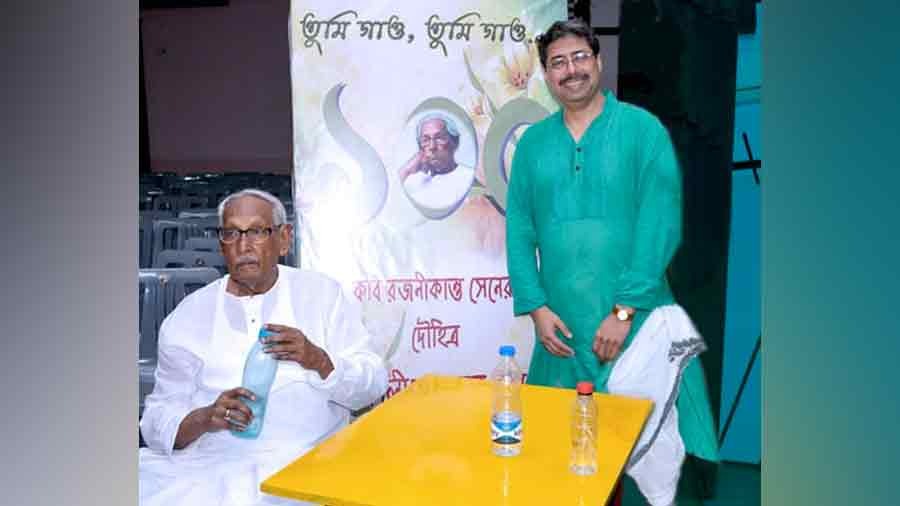
Arijit Roy Chowdhury with his Mastermoshai
Arijit Roy Chowdhury, disciple of Dilip Kumar Roy for 35 years, is an exponent of old (puratani) Bengali songs specialising in Atulprasad, Rajanikanta, DL Roy and Himangshu Dutta. He runs a virtual musical school, Aitijhyo International Sangeet Academy.
